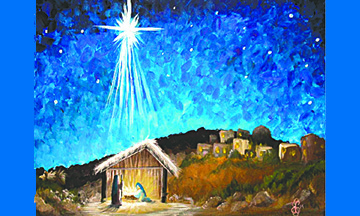
Natividad
Nativity
Ya va terminando este desalentador año 2020 y las miradas se enfocan ansiosamente en la Navidad, como buscando en ella una señal de esperanza y de paz, un respiro en medio de las angustias vividas y la inestabilidad de estos días claustrofóbicos.
Poco, sin embargo, podrá darnos una celebración que lleva muchas décadas alejada de su significado original y convertida, por obra y gracia del marketing, en poco menos que un amuleto de buena suerte o un símbolo vacío de buenas intenciones. No se equivoque, la Navidad sólo será significativa si recuperamos su verdadero significado.
Navidad no es un árbol con luces (por más estrella de Belén que se ponga en su cúspide), ni una competencia para ver quién decora mejor su casa. Navidad tampoco es un anciano barbudo y obeso con traje rojo, trineo, renos y una bolsa de regalos al hombro. No es tampoco la principal cena familiar del año, por muy especial que ésta sea. Y mucho menos es navidad esa vorágine paranoica por comprar regalos (así no tengamos dinero) con la excusa de no defraudar la ilusión de los niños y familiares. Nada de esto es Navidad, aunque nos lo repitan a cada momento los grandes medios de desinformación.
Navidad viene de “natividad”, es decir, nacimiento. Pero no se trata de un nacimiento cualquiera, sino del nacimiento más extraordinario de la historia, de aquel acontecimiento que la dividió en dos.
Celebramos el día en que el Creador de todo el universo se manifestó humildemente como un niño humano en este pequeño planeta del sistema planetario solar en la vía láctea. Y lo engrandece más el hecho de que no lo hizo con la pompa y majestad cósmica que se hubiera presupuesto, sino que nació en un comedero de ganado de un pequeño pueblo, en una provincia alejada del Imperio Romano que dominaba occidente en ese momento: Belén de Judea.
Celebramos, entonces, el día glorioso en que la humanidad fue consubstanciada para siempre con la divinidad y la divinidad fue consubstanciada para siempre con la humanidad. El día en que el Señor Jesús nació 100% divino y 100% humano: Dios hecho hombre, o como está escrito en la Biblia, en 1 Timoteo 3:16, el día que “Dios fue manifestado en carne”.
Nada fue igual después de este día, aunque el mundo no lo supiera en ese momento, y nada será igual hoy si descubrimos la verdadera Natividad.
Nativity
This discouraging year 2020 is ending and eyes are anxiously focused on Christmas, as if looking for a sign of hope and peace, a respite in the midst of the anguish experienced and the instability of these claustrophobic days.
Little, however, will be able to give us a celebration that has been far removed from its original meaning for many decades and converted, by the work and grace of marketing, into little less than a good luck charm or an empty symbol of good intentions. Make no mistake, Christmas will only be meaningful if we regain its true meaning.
Christmas is not a tree with lights (no matter how much star of Bethlehem is placed at its peak), nor is it a competition to see who best decorates your home. Christmas is also not an obese, bearded old man in a red suit, sleigh, reindeer and a bag of gifts on his shoulder. Nor is it the main family dinner of the year, however special it may be. And much less is Christmas that paranoid whirlwind to buy gifts (even if we don’t have any money) with the excuse of not disappointing the illusion of children and relatives. None of this is Christmas, although the great disinformation media repeat it to us every moment.
Christmas comes from “nativity”, that is, birth. But this is not just any birth, but the most extraordinary birth in history, that event that divided it in two.
We celebrate the day when the Creator of the entire universe humbly manifested as a human child on this little planet of the solar planetary system in the Milky Way. And he is further enhanced by the fact that he did not do it with the pomp and cosmic majesty that would have been assumed but was born in a cattle trough in a small town, in a province far from the Roman Empire that dominated the West at that time: Bethlehem of Judea.
We celebrate, then, the glorious day when humanity was forever consubstantiated with divinity and divinity was forever consubstantiated with humanity. The day the Lord Jesus was born 100% divine and 100% human: God made man, or as it is written in the Bible, in 1 Timothy 3:16, the day that “God was manifested in the flesh.”
Nothing was the same after this day, even if the world did not know it at that time, and nothing will be the same today if we discover the true Nativity.

























